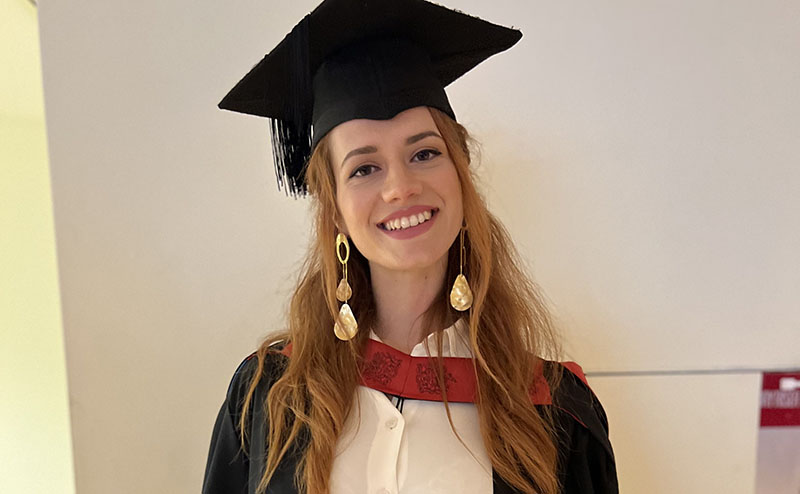Renia Sakatzidou

Special Educational Needs and Inclusion (Autism Pathway) MA
View the course- Year of Graduation: 2021
- Current Job title: ABA Therapist
- Organisation: First Bridge Centre
- Industry sector: Education
Your Course of Study
Why did you choose your course?
After my graduation from my Bachelor’s degree in Educational and Social Policy in Greece, and after having worked as a SEN Teacher in Greece for two fulfilling years, I decided to expand my knowledge in educating individuals with disabilities and specialise in a specific kind of disability. Since I have always been intrigued in the way people with autism behave, think, and generally are, and teaching them has always been rewarding and made me realise what really matters in life, I chose to start the MA Special Educational Needs and Inclusion (Autism Pathway) course at the University of Northampton. I specifically chose this university because it was one of the newest and most contemporary universities in the UK and had very good reviews in the field of SEN.
What aspects of the course did you enjoy the most and why?
I really enjoyed the way sessions were conducted and how flexible the university was regarding its students. Although the Covid-19 outbreak occurred while I was studying, all sessions and courses kept running as usual, with the only difference being that they were online. Although this was something very new and unfamiliar to everyone, I was positively surprised by how nicely the university as well as all tutors had planned everything and how smoothly we moved from face-to-face sessions to online ones. Sessions still contained group conversations (which were one of the best things during sessions, as we were given the opportunity to meet our colleagues and share different views and experiences that are key to our personal development) and projects. Also, the tutors were really helpful throughout my whole university experience and kindly supported me with the process of writing my essays and my dissertation. Personally, I enjoyed the online sessions a lot as I could join from my personal space, where I was more comfortable and I didn’t have to travel after work, which would be more tiring. Also, we had numerous opportunities to benefit from the online resources of the course and the online systems, such as the library (NELSON), on which you can find literally everything you’re looking for!
Your University – Career Journey
How do you think your studies have helped your career or personal development?
I would say that it’s up to every person how they will develop themselves and what career they will follow. When I finished my MA and considering that I am a foreigner in the UK, I was absolutely clueless as to what career path I could follow. I used to be a Teaching Assistant in a primary school while I was studying and I really didn’t want to continue this career after my degree. I remember emailing my personal tutor (who was absolutely amazing and supported her students in every way possible) and asking her opinion about the career options I may have after university. Once again and even though I was not officially her student anymore, she was more than willing to give me her advice. After our conversation, I realised that studying SEN doesn’t mean you have to be either a SEN Teacher or a Teaching Assistant – there are plenty of other professions that are linked to this course, including jobs in diversity and inclusion, therapist jobs (which might need some extra courses to increase your skills), early intervention (EI), and jobs in the assessment and diagnosis sector. I, particularly, decided to delve into the EI field and specialise in behavioural and cognitive techniques where I can make a great impact on children’s lives from very early on, to help them acquire the skills needed to attend mainstream schools and have the same opportunities as everyone else! I currently work as an ABA Therapist for young children with developmental delays and/or autism. This is the first job I have undertaken since my graduation and the centre I work for was my first choice from the beginning. The combination of my work and academic experience has given me great knowledge in the field and enabled me to obtain a holistic understanding of inclusion – this made me an excellent applicant in the interview process and has significantly contributed to my new role.